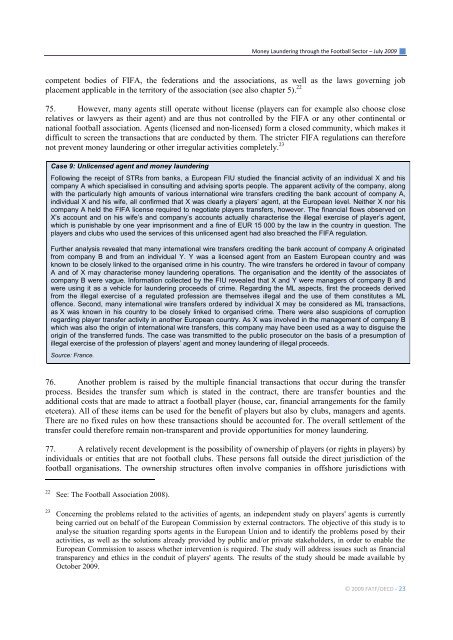Money Laundering through the Football Sector
Money Laundering through the Football Sector
Money Laundering through the Football Sector
Create successful ePaper yourself
Turn your PDF publications into a flip-book with our unique Google optimized e-Paper software.
<strong>Money</strong> <strong>Laundering</strong> <strong>through</strong> <strong>the</strong> <strong>Football</strong> <strong>Sector</strong> – July 2009 <br />
competent bodies of FIFA, <strong>the</strong> federations and <strong>the</strong> associations, as well as <strong>the</strong> laws governing job<br />
placement applicable in <strong>the</strong> territory of <strong>the</strong> association (see also chapter 5). 22<br />
75. However, many agents still operate without license (players can for example also choose close<br />
relatives or lawyers as <strong>the</strong>ir agent) and are thus not controlled by <strong>the</strong> FIFA or any o<strong>the</strong>r continental or<br />
national football association. Agents (licensed and non-licensed) form a closed community, which makes it<br />
difficult to screen <strong>the</strong> transactions that are conducted by <strong>the</strong>m. The stricter FIFA regulations can <strong>the</strong>refore<br />
not prevent money laundering or o<strong>the</strong>r irregular activities completely. 23<br />
Case 9: Unlicensed agent and money laundering<br />
Following <strong>the</strong> receipt of STRs from banks, a European FIU studied <strong>the</strong> financial activity of an individual X and his<br />
company A which specialised in consulting and advising sports people. The apparent activity of <strong>the</strong> company, along<br />
with <strong>the</strong> particularly high amounts of various international wire transfers crediting <strong>the</strong> bank account of company A,<br />
individual X and his wife, all confirmed that X was clearly a players‟ agent, at <strong>the</strong> European level. Nei<strong>the</strong>r X nor his<br />
company A held <strong>the</strong> FIFA license required to negotiate players transfers, however. The financial flows observed on<br />
X‟s account and on his wife‟s and company‟s accounts actually characterise <strong>the</strong> illegal exercise of player‟s agent,<br />
which is punishable by one year imprisonment and a fine of EUR 15 000 by <strong>the</strong> law in <strong>the</strong> country in question. The<br />
players and clubs who used <strong>the</strong> services of this unlicensed agent had also breached <strong>the</strong> FIFA regulation.<br />
Fur<strong>the</strong>r analysis revealed that many international wire transfers crediting <strong>the</strong> bank account of company A originated<br />
from company B and from an individual Y. Y was a licensed agent from an Eastern European country and was<br />
known to be closely linked to <strong>the</strong> organised crime in his country. The wire transfers he ordered in favour of company<br />
A and of X may characterise money laundering operations. The organisation and <strong>the</strong> identity of <strong>the</strong> associates of<br />
company B were vague. Information collected by <strong>the</strong> FIU revealed that X and Y were managers of company B and<br />
were using it as a vehicle for laundering proceeds of crime. Regarding <strong>the</strong> ML aspects, first <strong>the</strong> proceeds derived<br />
from <strong>the</strong> illegal exercise of a regulated profession are <strong>the</strong>mselves illegal and <strong>the</strong> use of <strong>the</strong>m constitutes a ML<br />
offence. Second, many international wire transfers ordered by individual X may be considered as ML transactions,<br />
as X was known in his country to be closely linked to organised crime. There were also suspicions of corruption<br />
regarding player transfer activity in ano<strong>the</strong>r European country. As X was involved in <strong>the</strong> management of company B<br />
which was also <strong>the</strong> origin of international wire transfers, this company may have been used as a way to disguise <strong>the</strong><br />
origin of <strong>the</strong> transferred funds. The case was transmitted to <strong>the</strong> public prosecutor on <strong>the</strong> basis of a presumption of<br />
illegal exercise of <strong>the</strong> profession of players‟ agent and money laundering of illegal proceeds.<br />
Source: France.<br />
76. Ano<strong>the</strong>r problem is raised by <strong>the</strong> multiple financial transactions that occur during <strong>the</strong> transfer<br />
process. Besides <strong>the</strong> transfer sum which is stated in <strong>the</strong> contract, <strong>the</strong>re are transfer bounties and <strong>the</strong><br />
additional costs that are made to attract a football player (house, car, financial arrangements for <strong>the</strong> family<br />
etcetera). All of <strong>the</strong>se items can be used for <strong>the</strong> benefit of players but also by clubs, managers and agents.<br />
There are no fixed rules on how <strong>the</strong>se transactions should be accounted for. The overall settlement of <strong>the</strong><br />
transfer could <strong>the</strong>refore remain non-transparent and provide opportunities for money laundering.<br />
77. A relatively recent development is <strong>the</strong> possibility of ownership of players (or rights in players) by<br />
individuals or entities that are not football clubs. These persons fall outside <strong>the</strong> direct jurisdiction of <strong>the</strong><br />
football organisations. The ownership structures often involve companies in offshore jurisdictions with<br />
22 See: The <strong>Football</strong> Association 2008).<br />
23 Concerning <strong>the</strong> problems related to <strong>the</strong> activities of agents, an independent study on players' agents is currently<br />
being carried out on behalf of <strong>the</strong> European Commission by external contractors. The objective of this study is to<br />
analyse <strong>the</strong> situation regarding sports agents in <strong>the</strong> European Union and to identify <strong>the</strong> problems posed by <strong>the</strong>ir<br />
activities, as well as <strong>the</strong> solutions already provided by public and/or private stakeholders, in order to enable <strong>the</strong><br />
European Commission to assess whe<strong>the</strong>r intervention is required. The study will address issues such as financial<br />
transparency and ethics in <strong>the</strong> conduit of players' agents. The results of <strong>the</strong> study should be made available by<br />
October 2009.<br />
© 2009 FATF/OECD - 23


